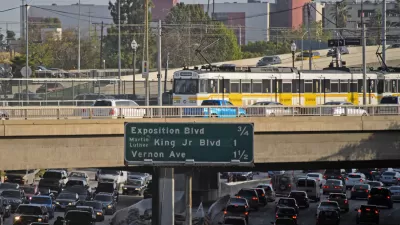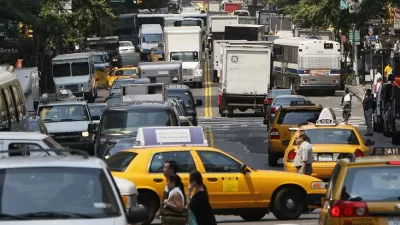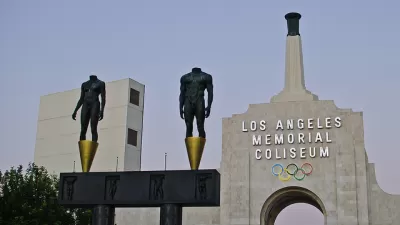The city of Los Angeles is looking for ways to close a $26.2 billion funding gap for its plan to complete 28 transportation projects by the 2028 Summer Olympics.

"Charging tolls on Los Angeles freeways during times of highest use and taxing Uber and Lyft rides are two new sources of revenue being considered by the Los Angeles County Metropolitan Transportation Authority," reports Steve Scauzillo.
The very preliminary proposal for congestion pricing "would charge for use of all lanes on freeways entering inner city core areas of Los Angeles, such as the 101, 5, 10 and 60 freeways during rush hours, while keeping the freeways free during off-peak hours."
Scauzillo also repeats some of Washington's arguments in support of the idea, like the precedent for congestion as a congestion reduction tool in cities like London, Stockholm, Singapore, and Milan.
A separate article by Elijah Chiland details some of the reactions of Los Angeles political leaders to the notion of congestion pricing. Chiland also previewed the report before the public presentation.
Congestion pricing would raise $1.2 billion a year. A tax on transportation network companies, also under discussion, would raise between $25 million to $350 million a year. That leaves the city still scrambling to cover the rest of the funding gap to build all of the projects on the "Twenty-eight by 28" list.
FULL STORY: L.A. Metro considering adding congestion pricing to jammed freeways

Maui's Vacation Rental Debate Turns Ugly
Verbal attacks, misinformation campaigns and fistfights plague a high-stakes debate to convert thousands of vacation rentals into long-term housing.

Planetizen Federal Action Tracker
A weekly monitor of how Trump’s orders and actions are impacting planners and planning in America.

In Urban Planning, AI Prompting Could be the New Design Thinking
Creativity has long been key to great urban design. What if we see AI as our new creative partner?

King County Supportive Housing Program Offers Hope for Unhoused Residents
The county is taking a ‘Housing First’ approach that prioritizes getting people into housing, then offering wraparound supportive services.

Researchers Use AI to Get Clearer Picture of US Housing
Analysts are using artificial intelligence to supercharge their research by allowing them to comb through data faster. Though these AI tools can be error prone, they save time and housing researchers are optimistic about the future.

Making Shared Micromobility More Inclusive
Cities and shared mobility system operators can do more to include people with disabilities in planning and operations, per a new report.
Urban Design for Planners 1: Software Tools
This six-course series explores essential urban design concepts using open source software and equips planners with the tools they need to participate fully in the urban design process.
Planning for Universal Design
Learn the tools for implementing Universal Design in planning regulations.
planning NEXT
Appalachian Highlands Housing Partners
Gallatin County Department of Planning & Community Development
Mpact (founded as Rail~Volution)
City of Camden Redevelopment Agency
City of Astoria
City of Portland
City of Laramie





























